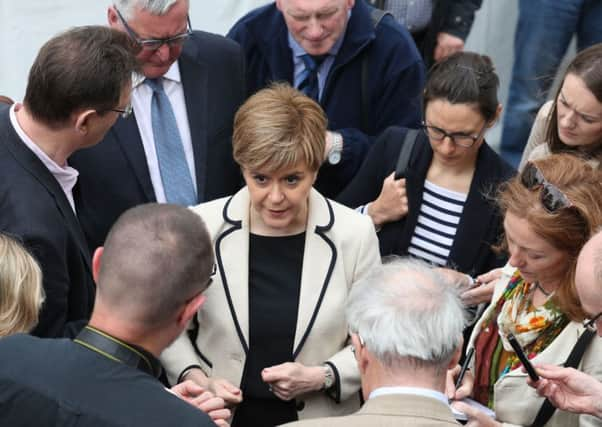Euan McColm: SNP sceptics close in on Nicola Sturgeon


When Alex Salmond was challenged over the possible negative implications of independence during the 2014 referendum campaign, he would often claim that whoever was raising a particular issue – a chancellor ruling out a currency union, say, or a business suggesting relocation – was bluffing.
Salmond would repeatedly avoid tackling complicated questions for which he didn’t have answers by insisting that the scenario outlined would never come to pass: of course there would be a currency union; of course oil would soon regain its value.
Advertisement
Hide AdAdvertisement
Hide AdBecause he was on the losing side, Salmond’s assertions were never challenged; we will never know whether there would have been a currency union (though, to be clear, there absolutely wouldn’t have been) because the majority of Scots voted in favour of remaining part of the UK.
This use of unprovable assertions was very helpful to the SNP during tricky campaign moments. But it’s a line of defence that’s run its course.
Campaigners in any future Scottish independence referendum will struggle to argue that prophecies of job losses, for example, are scaremongering once we have seen the impact of Brexit.
Hundreds of jobs are to go in London after EU leaders have officially launched a competition between member states to decide which will host agencies responsible for medicines and banking. Once these jobs are relocated, London will also lose out on the revenue from hotel stays and conferences associated with them.
During the referendum campaign, Remainers warned that departure from the EU would have consequences for jobs but this was batted away as scaremongering. Why did those in favour of the EU have to talk the UK down?
As First Minister Nicola Sturgeon considers her strategy for a dreamed-of second independence referendum she will have to factor in the reality of Brexit showing that constitutional upheaval comes at an immediate, tangible cost. The issue of EU jobs leaving is another straw on the back of the SNP’s weary camel.
Brexit was supposed to give Sturgeon the added momentum she needed to win the second referendum she wants to hold by early 2019. Scots voters – a majority of whom voted Remain last year – would be so incensed at being “dragged out of Europe against their will” that they’d finally call time on membership of the UK. Instead, the issue of Europe has clattered into the nationalists’ plans and upset everything. Support for independence hasn’t swelled and the SNP is losing voters at the sort of rate previously demonstrated by the Labour Party.
For the first time in living memory, senior SNP figures have begun to doubt the First Minister’s vision. On the issue of Brexit illustrating the problems of independence, one party insider is especially forthright.
Advertisement
Hide AdAdvertisement
Hide AdThe First Minister, says this seasoned campaigner, became so obsessed by the idea of a problematic Brexit helping persuade No voters to support independence that she lost sight of the fact that it would seriously damage the SNP line that departure from the UK would be straightforward.
And the doubters speak up on other issues, too. There is a growing sense that Sturgeon and her husband, SNP chief executive Peter Murrell, are losing the confidence of some elected members. Given the nationalists’ remarkable record of discipline this past decade or so, it’s quite remarkable the degree to which briefing against the leadership has spread.
Sturgeon was caught unawares by the general election results. The SNP expected to lose as many as a dozen of the 56 seats it won in 2015. That the tally far exceeded worst case predictions exposed a vulnerability the SNP had previously concealed beneath a veneer of overweening confidence.
The defeat of the SNP’s Westminster leader Angus Robertson, a parliamentarian of the first order, removes from the top tier of the party one of its few serious thinkers. If the First Minister is lucky, a winnable by-election will come along and Robertson can join her at Holyrood. Sturgeon and her Deputy First Minister, John Swinney, are currently micromanaging a team of second rate ministers. Robertson and others of his stature (if they can be found) could play a useful role in lifting some of the pressure from Sturgeon and Swinney.
The departure two years ago of communications director Kevin Pringle also continues to be felt. Frequently, the SNP seems uncertain of its story.
It’s true that Sturgeon leads the most successful party in Scotland and she’s just won 35 of the country’s 59 Westminster seats. This is a considerable achievement. But just a few weeks ago, it would have been unthinkable for anyone within the SNP to question – even off the record – the First Minister’s strategy. And now that some are raising doubts, others may feel empowered to follow.
Sturgeon’s leadership is not in crisis, but neither is it as strong as it once was. There is mounting frustration among some senior SNP figures that she will not rule out a second referendum, unequivocally. Those who feel she is mistaken in continuing to dangle the prospect of a second constitutional vote in the next two years reason that, since there is only minority support for it and since the UK government could – and would – block it, anyway, it’s currently a dead issue.
Sturgeon must surely see this too, yet she clings grimly to the idea of a referendum that won’t happen.
Advertisement
Hide AdAdvertisement
Hide AdSturgeon has spent two decades building a reputation as a politician of great skill and dexterity. Now that reputation is taking a pounding. With colleagues muttering darkly about her performance, her personal ratings dropping, and her dream of a second independence referendum in tatters, the First Minister is up against it as never before.
Nicola Sturgeon had grown accustomed to setting the political agenda. Now, she is at the mercy of events and opponents and, I’m afraid, she’s not rising to the challenges before her.